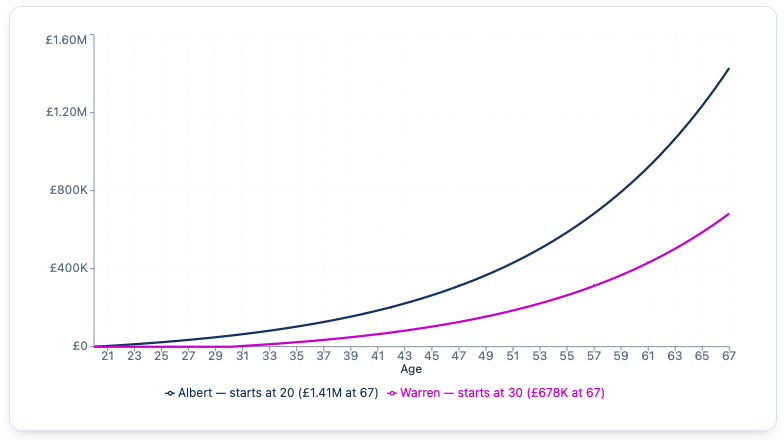Step-by-step guide to creating raised garden beds

Compound interest is one of the most powerful forces in finance. It’s how small, consistent savings can grow into something meaningful over time. Put simply, it’s interest earning interest. When you invest or save, the interest you earn is added to your original amount, and then future interest is calculated on this new total. Over time, this creates a snowball effect - your money grows not just from what you put in, but also from what it’s already earned.
A Simple Example
Let’s say you invest £1,000 in a savings or investment account that earns 5% interest a year. After the first year, you’d have £1,050 - your original £1,000 plus £50 interest.
In year two, you don’t just earn interest on the £1,000 - you also earn it on the £50 you made last year. Your total grows to £1,102.50.
It may not sound dramatic at first, but give it time - 10, 20, or 30 years - and the effect can be enormous.
Why Time Is Your Best Friend
The longer your money is invested, the more powerful compound interest can become. That’s why starting early, even with smaller amounts, can make a huge difference later on. There’s a reason Albert Einstein called compound interest the “eighth wonder of the world.” And Warren Buffett credits it for much of his wealth, saying his success comes down to “good genes and compound interest.” It’s not magic, it’s maths. But it’s maths that works quietly in your favour when you give it time.
Let’s imagine an example: Albert and Warren both invest £300 a month, earning a 7% annual return compounded annually. The only difference? Albert starts at age 20, while Warren waits until age 30.
By the time they both reach 67, Albert’s pension has grown to £1,414,775.14, while Warren’s is worth £678,148.92 — a difference of more than £736,000, simply because Albert started 10 years earlier.

What About Market Downturns
Markets don’t rise every year though, no matter how much you want them to. Some years they fall, and when that happens your pot can go down too. In those periods, compounding can work in reverse for a while because future growth starts from a smaller base. This is normal. The key is staying invested and staying consistent. Regular monthly contributions mean you are buying at a range of prices, including during dips, which can help future growth when markets recover. Think of it like planting a tree. You might get a season of rough weather, but if you keep caring for it over time, it still grows strong.
Compound And Your Pension
Your pension is one of the most effective ways to benefit from compound interest. Every contribution you make, and every bit of investment growth, compounds year after year. That’s why tracking and combining old pension pots can be so powerful, it helps keep your money working harder, in one place, over time. Yes it may be frustrating that you have to wait a while to access your money, but if you do it right, it’s definitely worth the wait.
The Bottom Line
Compound interest rewards time and consistency. The earlier you start, the greater the potential benefit. But it’s never too late to take control, the best time may have been yesterday, but the next best time is now.
Your capital is at risk. The value of your investments can go down as well as up, and you may get back less than you invest.
This content is for general information only and is not financial advice









